#beauty industry
Text
Collagen craze drives deforestation and rights abuses
For the first time an investigation has linked collagen powder to violence against Indigenous peoples in Brazilian forests

The stench arrives before the lorries do. They are carrying skins that were stripped from cattle carcasses days ago. Flies are everywhere.
The lorries’ destination is Amparo, a small industrial town in São Paulo state, southeastern Brazil. Here, Rousselot, a company owned by the Texan business Darling Ingredients, extracts collagen – the active ingredient in health supplements at the centre of a global wellness craze.
But while collagen’s most evangelical users claim the protein can improve hair, skin, nails and joints, slowing the ageing process, it has a dubious effect on the health of the planet. Collagen can be extracted from fish, pig and cattle skin, but behind the wildly popular “bovine” variety in particular lies an opaque industry driving the destruction of tropical forests and fuelling violence and human rights abuses in the Brazilian Amazon.
An investigation by the Bureau of Investigative Journalism, the Guardian, ITV and O Joio e O Trigo has found that tens of thousands of cattle raised on farms damaging tropical forests were processed at abattoirs connected to international collagen supply chains.
Some of this collagen can be traced all the way to Nestl��-owned Vital Proteins, a major producer of collagen supplements championed by the actress Jennifer Aniston. Vital Proteins is sold globally – including online on Amazon, in Walmart stores in the US, in Holland & Barrett and Boots in the UK and in Costco in both countries.
The investigation – the first to connect bovine collagen with tropical forest loss and violence against Indigenous peoples – found at least 2,600 sq km of deforestation linked to the supply chains of two Brazil-based collagen operations with connections to Darling: Rousselot and Gelnex, which is in the process of being acquired by Darling for $1.2bn. It is unclear how much of this deforestation, which was calculated by the Center for Climate Crime Analysis, is linked to Vital Proteins.
Continue reading.
#brazil#politics#brazilian politics#environmental justice#environmentalism#indigenous rights#beauty industry#mod nise da silveira#image description in alt
6K notes
·
View notes
Text
This is SO REAL like first of all, the matriarchy they initially had was still this hyper-feminine mess where all the barbies still had to look perfect and attractive and have their hair and makeup done etc wereas the Kens simply, did not. Not to mention Alan even. And then still the only pressing harm of the Barbie-run society was that Barbie didn't give Ken much of her time in the way that he wanted her to, and as a result he subjugated every woman in the world?? He made all the Barbies ramp up the performance of the male gaze, spoke down to them, stole their literal houses and hard work, and enslaved them, and then the message was still like "uwu Barbie should've given more time to Ken so he didn't react this way" like no FUCK OFF are you kidding? The Barbies should've just systematically eliminated the Kens because at best they're useless and at worst they're clamoring to cause actual material harm. I WISH the movie lived up to "deeply bizarre and anti-man". It's actually really telling where we are in society that so many see this as an actually radical perspective filled with man-hate when it was literally so coddling to men. Don't get me wrong either, I did enjoy it for what it was like I know it wasn't going to go into an actual deep leftist analysis or anything but this reaction to it as though it had is making me nuts
#barbie#barbenheimer#barbie movie#feminism#feminist#leftism#leftist feminist#femininity#male gaze#misandry#anti man#radical feminism#choice feminism#beauty#beauty industry#conservatives
2K notes
·
View notes
Text
It's insidious that you can't see women's real faces anywhere. All you see is makeup. How often do you think little girls should get to see women's faces as they are? Don't you think it's healthier for girls to see women's real faces everywhere they go? Why are we teaching girls they can't even just exist? They have to put on the mask. They have to be approved. They can't show their face. They can't see faces. But only for women. They can see men. Boys are free. What is this teaching girls? Why are women's faces always covered? Do you not see how terrifying and dystopian it is? I'm looking for a woman's face, for comfort, and all I see is makeup.
985 notes
·
View notes
Text
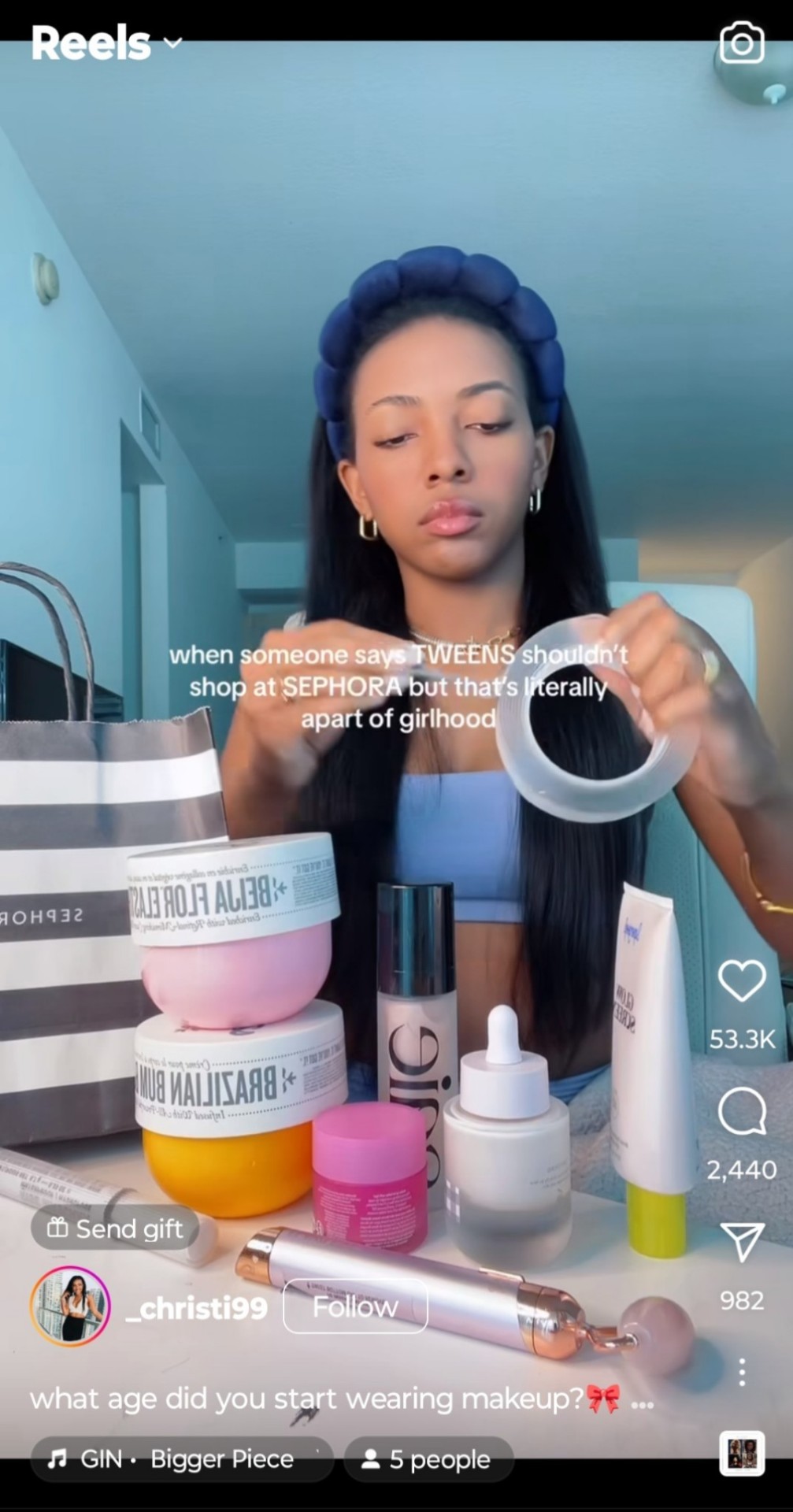
I guess I'm a man now?
#shitposting#beauty industry#free my ggirks from the shackles if mandatory femininity#or whatever#receipts
257 notes
·
View notes
Text
I recently saw a reel on Instagram showing a woman using a relaxer and one of the comments said smth like "hey just for your information, this relaxer has a class action lawsuit because it gave women who used it cancer" in a VERY neutral tone, she just wrote it as a fact. and I shit you not the replies to this comment were all "well it's her choice to use it even if it's carcinogenic!! Omg not everyone likes natural hair, you pickme!"
Real "omg it's her choice to bind her feet!" vibes. It's so absurd and evil.
637 notes
·
View notes
Text
Actually I’m not going to listen to you describe a feature of my body like a problem while trying to sell me your product
#except corporations profit off of insecurities so every time I feel it I say no I’m not doing this today#my body is my body is my body is my body and I am thankful for her#feminism#beauty industry
1K notes
·
View notes
Text
okay, so
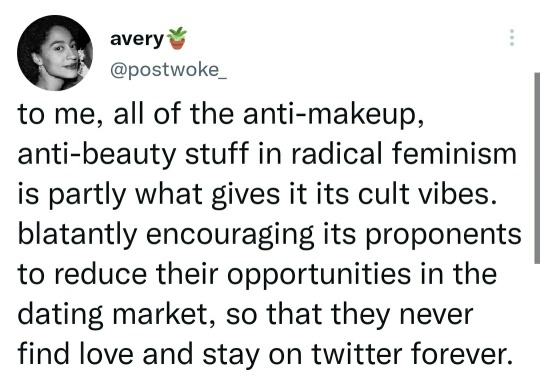
I saw this on Twitter this morning, it made me laugh not gonna lie... First of all it should be pretty telling of the true's men nature if they suddenly decide they do not want to date you anymore because you do not want to adhere to some stupid standards that do not exist for them. Secondly... Thinking that radfems have a 'cult vibe' for going against beauty/makeup industry when most of magazine won't let you publish articles about how even skin routine can ruin your skin microbiome?
(leaving a couple of links about it)
this one is an interesting one as well
Speaking of makeup industry I'm pretty sure there are a gazillion of articles about it but even without linking some of them I think it's pretty obvious that nobody will ever tell you:-"Hey, we created market based on making women feel insecure, we're inventing new insecurities to sell to them while we're making billions out of it'.
#radfem#radical feminism#radblr#radfems please interact#radfems do interact#radfem safe#radical feminst#anti beauty industry#beauty industry#anti makeup#makeup industry
2K notes
·
View notes
Text
"my eyeliner is sharp enough to kill a man"
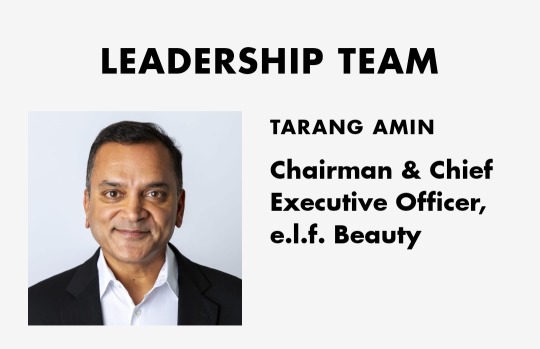
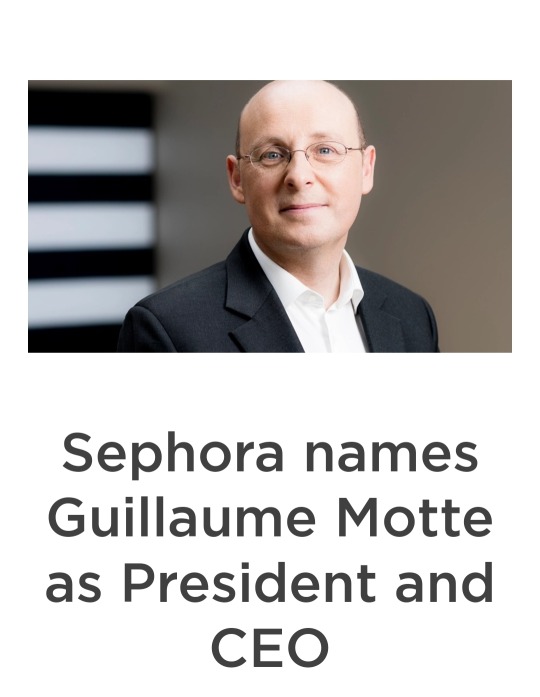
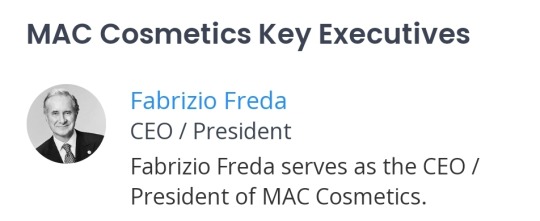
they are shaking I'm sure
#radblr#radical feminism#radical feminists do interact#radical feminist safe#libfem#anti makeup#anti beauty industry#beauty culture#beauty industry#terfsafe#terfblr#radical feminists do touch#personal
133 notes
·
View notes
Text

Writer Spotlight: Elise Hu
We recently met with Elise Hu (@elisegoeseast) to discuss her illuminating title, Flawless—Lessons in Looks and Culture from the K-Beauty Capital. Elise is a journalist, podcaster, and media start-up founder. She’s the host of TED Talks Daily and host-at-large at NPR, where she spent nearly a decade as a reporter. As an international correspondent, she has reported stories from more than a dozen countries and opened NPR’s first-ever Seoul bureau in 2015. Previously, Elise helped found The Texas Tribune, a nonprofit digital start-up, after stops at many stations as a television news reporter. Her journalism work has won the national Edward R. Murrow and duPont Columbia awards, among others. An honors graduate of the University of Missouri School of Journalism, she lives in Los Angeles.
Can you begin by telling us a little bit about how Flawless came to be and what made you want to write about K-beauty?
It’s my unfinished business from my time in Seoul. Especially in the last year I spent living in Korea, I was constantly chasing the latest geopolitical headlines (namely, North Korean leader Kim Jong Un’s big moves that year). It meant I didn’t get to delve into my nagging frustrations of feeling second-class as an Asian woman in Korea and the under-reported experiences of South Korean women at the time. They were staging record-setting women’s rights rallies during my time abroad in response to a stark gender divide in Korea. It is one of the world’s most influential countries (and the 10th largest economy) and ranks shockingly low on gender equality metrics. That imbalance really shows up in what’s expected of how women should look and behave. Flawless explores the intersection of gender politics and beauty standards.
Flawless punctuates reportage with life writing, anchoring the research within your subjective context as someone who lived in the middle of it but also had an outside eye on it. Was this a conscious decision before you began writing?
I planned to have fewer of my personal stories in the book, actually. Originally, I wanted to be embedded with South Korean women and girls who would illustrate the social issues I was investigating, but I wound up being the narrative thread because of the pandemic. The lockdowns and two years of long, mandatory quarantines in South Korea meant that traveling there and staying for a while to report and build on-the-ground relationships was nearly impossible. I also have three small children in LA, so the embedding plan was scuttled real fast.
One of the central questions the book asks of globalized society at large, corporations, and various communities is, “What is beauty for?” How has your response to this question changed while producing Flawless?
I think I’ve gotten simultaneously more optimistic and cynical about it. More cynical in that the more I researched beauty, the more I understood physical beauty as a class performance—humans have long used it to get into rooms—more power in relationships, social communities, economically, or all of the above at once. And, as a class performance, those with the most resources usually have the most access to doing the work it takes (spending the money) to look the part, which is marginalizing for everyone else and keeps lower classes in a cycle of wanting and reaching. On the flip side, I’m more optimistic about what beauty is for, in that I have learned to separate beauty from appearance: I think of beauty in the way I think about love or truth, these universal—and largely spiritual—ideas that we all seek, that feed our souls. And that’s a way to frame beauty that isn’t tied in with overt consumerism or having to modify ourselves at all.
This is your first book—has anything surprised you in the publishing or publicity process for Flawless?
I was most surprised by how much I enjoyed recording my own audiobook! I felt most in flow and joyful doing that more than anything else. Each sentence I read aloud was exactly the way I heard it in my head when I wrote it, which is such a privilege to have been able to do as an author.
Do you have a favorite reaction from a reader?
I don’t know if it’s the favorite, but recency bias is a factor—I just got a DM this week from a woman writing about how the book helped put into words so much of what she felt and experienced, despite the fact she is not ethnically Korean, or in Korea, which is the setting of most of the book. It means a lot to me that reporting or art can connect us and illuminate shared experiences��in this case, learning to be more embodied and okay with however we look.
As a writer, journalist, and mother—how did you practice self-care when juggling work commitments, social life, and the creative processes of writing and editing?
I juggled by relying on my loved ones. I don’t think self-care can exist without caring for one another, and that means asking people in our circles for help. A lot of boba dates, long walks, laughter-filled phone calls, and random weekend trips really got me through the arduous project of book writing (more painful than childbirth, emotionally speaking).
What is your writing routine like, and how did the process differ from your other reporting work? Did you pick up any habits that you’ve held on to?
My book writing routine was very meandering, whereas my broadcast reporting and writing are quite linear. I have tight deadlines for news, so it’s wham, bam, and the piece is out. With the book, I had two years to turn in a manuscript. I spent the year of lockdowns in “incubation mode,” where I consumed a lot of books, white papers, articles, and some films and podcasts, just taking in a lot of ideas to see where they might collide with each other and raise questions worth reporting on, letting them swim around in the swamp of my brain. When I was ready to write, I had a freelance editor, the indefatigable Carrie Frye, break my book outline into chunks so I could focus on smaller objectives and specific deadlines. Chunking the book so it didn’t seem like such a massive undertaking helped a lot. As for the writing, I never got to do a writer’s retreat or some idyllic cabin getaway to write. I wrote in the in-between moments—a one or two hour window when I had a break from the TED conference (which I attend every year as a TED host) or in those moments after the kids’ bedtime and before my own. One good habit I got into was getting away from my computer at midday. I’m really good about making lunch dates or going for a run to break up the monotony of staring at my screen all day long.
What’s good advice you’ve received about journalism that you would pass on to anyone just starting out?
All good reporting comes from great questions. Start with a clear question you seek to answer in your story, project, or book, and stay true to it and your quest to answer it. Once you are clear on what the thing is about, you won’t risk wandering too far from your focal point.
Thanks to Elise for answering our questions! You can follow her over at @elisegoeseast and check out her book Flawless here!
#writer spotlight#elise hu#flawless#k-beauty#beauty#beauty industry#feminism#gender politics#seoul#south korea#journalism#writing advice#reportage#flawlessthebook
239 notes
·
View notes
Text
Rib removal surgery is one of the craziest plastic surgery procedures I’ve ever heard of

Removing your ribs for an hourglass figure is extreme and yet, the surgery seems to be gaining popularity.
#plastic surgery#rib removal surgery#radblr#radfem#radical feminism#radfem safe#radical feminist#radical feminists please interact#radical feminist safe#radfems please interact#beauty industry
426 notes
·
View notes
Text

'If tomorrow, women woke up and decided they really liked their bodies, just think how many industries would go out of business.'
Dr. Gail Dines
#canva#radblr#radfem#radfems interact#radical feminism#radfems please do touch#feminism#radfem safe#radical feminst#feminist#beauty industry#gail dines#dr gail dines
283 notes
·
View notes
Text
i just will never get over how it's considered an industry standard for actresses to have cosmetic procedures that affect the way they are able to use and feel their faces. to see women who have full use of their expressions when younger and now do not is so shocking if you allow yourself to be shocked. having her facial muscles under her control was part of her hard-won skill set. and now she isn't into control of it anymore. she can't feel it. and for what?
#the first time I saw it was bird box Sandra bullock#plastic surgery#beauty industry#the most recent time that really shocked me was starlight in s2 of the boys#like it changed everything and I'm supposed to pretend nothing happened?
534 notes
·
View notes
Text
my favorite thing to say to liberals is “why don’t men choose to wear makeup and do only fans as much as women do? if it’s empowering and powerful and aids in self expression, why is it almost exclusively women doing it?” they never have a good answer. makes them reevaluate choices and misogyny. i love it
3K notes
·
View notes
Text
Thinking about the optics of repeatedly saying “hyperfemininity” and not just “femininity.” Discussing how unnatural and exaggerated expectations for women can be is important, but in many cases using “hyperfeminity” and not simply “femininity” reminds me of how the cultural conversation shifted from “beauty standards” to “impossible beauty standards”- it hides the real problem. One possible justification for it is that for most people, femininity is simply a collection of traits- pink, glitter, dresses- and not a cohesive cultural expectation for women like feminists believe, and so using ‘hyperfemininity’ in some contexts may be useful to get what we’re expressing across I generally think that feminists should be careful that acting like extreme femininity is the only harmful expectation for women, especially in regards to young girls, and not just being feminine as a whole.
#My post#radical feminism#radfem#radblr#gender roles#gender critical#anti gender roles#gender abolition#beauty culture#beauty industry#feminism#Beauty standards
69 notes
·
View notes
Text
For the past 2-3 years, the fashion industry doesn't 'proclaim' trends anymore, it proclaims whole 'aesthetics'. It's actually a genius and innovative marketing move, because instead of simply declaring faux fur a trend (as it always did), it declares a 'mob wife aesthetic', which is an own constellation of trends. So instead of just buying a faux fur coat, you have to buy the whole mob wife aesthetic starter kit (5-6 items? The more sales, the merrier). Same with 'clean girl' or 'old money' or 'quiet luxury'. The main thing is: Be everything but yourself.
Since the rise of social media and the now defunct democratization of fashion that came with it, the fashion industry has been struggling incessantly to control the narrative. These socalled 'aesthetics' have been things that have always existed, some of them even just last decade. The industry (read Vogue, Elle, etc) simply rebrands them as a marketing strategy.
This is all not just enabling even more unabashed consumerism, but it also makes people reject the idea of personal style and individuality. Anyone who follows these 'aesthetics' has a serious identity crisis.
Do we even know what a real person looks like anymore? Most of the beautiful people you see online or on magazines and media have been physically altered in one way or the other. If it isn't heavy photo editing, it is heavy plastic or cosmetic surgery, botox, eating disorders, breast augmentations, butliffts, microblading, all to fit the everchanging beauty standard or the trend of the day. Nowadays, it isn't even enough to be just skinny, because you need to spend hours in the gym working out those abs if you don't want to be labeled 'skinny fat'. (How abominable is this kind of thinking?)
The pressure is real. I think it is absolutely normal to have body or face dysmorphia nowadays or to feel depressed.
We are living in one of the most hostile times towards human beings in history, especially towards youth. Granted, before we used to have physical slavery, but the difference today is that the whole media, the whole culture, whole industries are dedicated to make us averse against our own selves on a daily or even minute-to-minute basis with social media. It is making us hate ourselves.
#fashion industry#beauty industry#food for thought#body dysmorphia#eating disorders#plastic surgery#mob wife aesthetic#clean girl aesthetic#old money aesthetic
62 notes
·
View notes
Note
Just accidentally fell down a rabbit hole of Reddit DIY cosmetic procedures community and I’m sick to my stomach😟 these women inject Botox against wrinkles, fat dissolvers, lip fillers and etc all by themselves at home without any training, ordering the materials from the internet. Quite a few posts are coming from women who are afraid they did something wrong because they feel unwell and it just makes me genuinely sad to see the lengths women are forced to go to fit in with society standards of forever youth, forever skinny, always pretty, it’s hard to blame anyone nowadays for choosing plastic surgery and cosmetic procedures because the pressure both direct and indirect is unreal and it’s so normalised and even though I wish everyone would feel truly happy and comfortable as they are without getting procedures solely for aesthetic purposes done, if they would still do it at least go to the professionals because this do it yourself thing is horrifying…
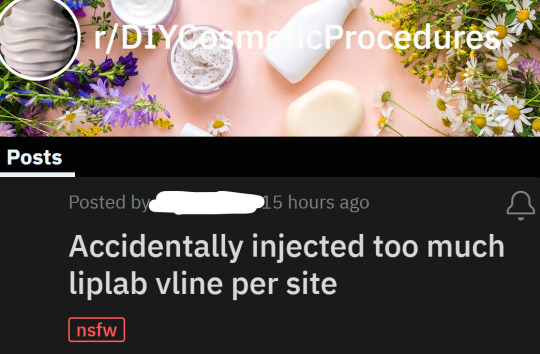
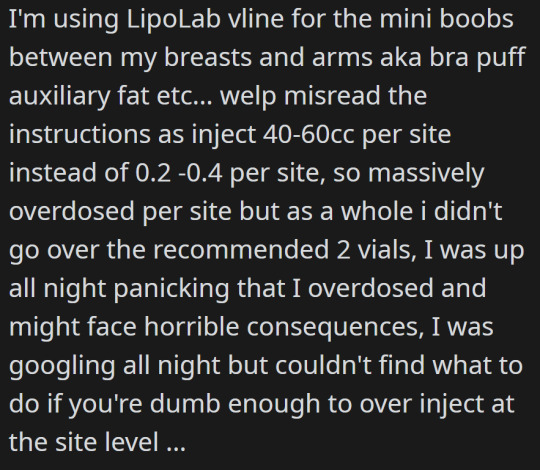
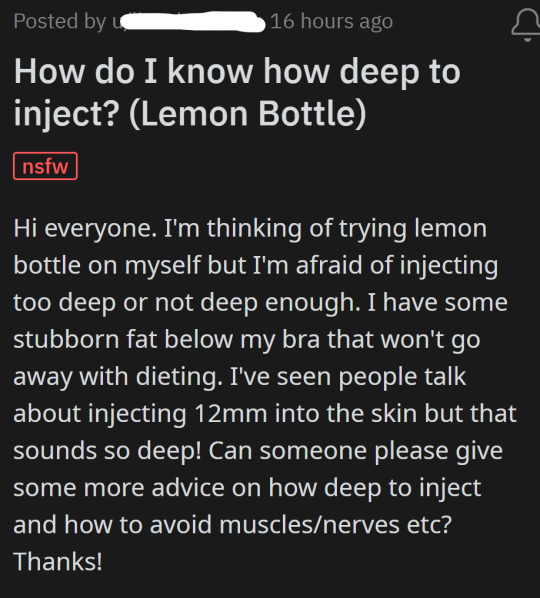
some examples of that subreddit.
I mean I get it, getting this stuff done by a professional is extremely expensive, but why do these people give each other tips instead of trying to accept the fact that they're aging or that their features don't fit the beauty standard?
I actually think that in a couple of hundred of years, we will see these excessive plastic surgeries as similar to foot binding in ancient China or people elongating their babies' skull for aesthetic reasons.
#radblr#radical feminism#radical feminists do interact#radical feminists please touch#feminism#gc feminist#gender abolition#radfems please touch#radfems please interact#radfem safe#beauty industry#beauty standards#fuck beauty standards
35 notes
·
View notes